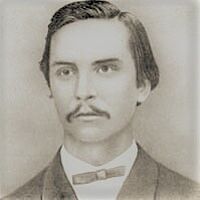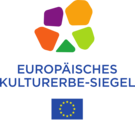Mykola V. Lysenko (22.03.1842–06.11.1912)
Mykola Vitalijowytsch Lysenko was a Ukrainian composer, pianist, conductor, pedagogue, organologist and ethnographer. He studied at the Leipzig Conservatory.

1. Biography
Mykola V. Lysenko was born on March 22nd, 1842 in Hrynky near Kremenchuk, Poltava Governorate (Eastern Ukraine), into a family with noble roots. While his mother wanted to keep folk traditions completely out of his upbringing, the Ukrainian language and customs were very important to his father. Mykola was enthralled by folk songs and Ukrainian traditions even as a child. His mother recognised her son's musical talent early on. At the age of five, she began teaching him the piano. From the age of 10, he attended a private school in Kiev. In Kharkiv, he continued his education at the grammar school. Lysenko was very interested in the subject of biology but did not want to neglect playing the piano. Therefore, he took professional lessons.
After completing his grammar school education in 1859, Lysenko began studying biology at the university in Kharkiv. Due to political upheavals, his parents moved to Kiev. There Lysenko continued his studies at the university. This period was decisive for his patriotic outlook. The works of the "Great Kobzar" – as the poet Taras Shevchenko was known in Ukraine – inspired him and many other students and encouraged them to become more involved in culture.
Lysenko founded a student choir in Kiev, which he himself conducted. Additionally, he became a member of a theatre group, for which he also composed.
In 1865, Lysenko finished his studies in biology and defended his dissertation. However, he also wanted to pursue a professional musical education. At that time, the Leipzig Conservatory, founded in 1843 by Felix Mendelssohn Bartholdy, enjoyed the greatest reputation among European educational institutions. Here Lysenko studied piano, music theory and composition with great diligence. As early as December 1867, he received an invitation to Prague to take part in an extraordinary concert of Slavic music. His performances as a pianist and composer received high public esteem, and he developed lifelong contacts with musicians and musical culture of other Slavic nationalities.
In October 1869, Mykola Lysenko returned to Kiev. Here he began to translate his artistic ideas, many of which he had acquired in Leipzig, into compositions. In 1879 Lysenko studied briefly with Nikolai Andreyevich Rimsky-Korsakov in St. Petersburg to improve his orchestration.
A meeting with the famous kobsa player Ostap Veresai stimulated him deeply and he imitated the sound of this Ukrainian lute in his composition Dumka-Shumka. In this way he took up the centuries-old tradition of the blind bards (Kobsars, singers). Lysenko also studied the folk music of Ukrainian vagrant musicians. He was and is revered as the father of Ukrainian national music.
In 1876, Tsar Alexander II signed a decree banning the import of Ukrainian books, the singing of Ukrainian songs in schools and stage performances in the Ukrainian language. Therefore, Lysenko had to publish his works abroad for a time. It took a lot of courage to resist the policy and demand appropriate rights.
Lysenko undertook choral and concert tours through Ukraine from 1886 to 1903. These became the high point of his conducting career. In 1904 he founded the "Music Drama School" in Kiev. Its teaching was modelled on that of the Leipzig Conservatory. He himself taught piano and composition. Lysenko founded another musical training school in Lviv (Lemberg). Both institutions still bear his name today.
His commitment to Ukrainian culture often brought him harassment. For example, although Lysenko composed a song in support of the Russian Revolution in 1905, he was arrested two years later.
In 1908, Lysenko was elected chairman of the Ukrainian Club, an association of Ukrainian national publications.
On 6 November 1912, Mykola V. Lysenko died of a heart attack. More than 30,000 people accompanied the funeral procession. He was buried in the Baikove cemetery in Kiev.
Lysenko's life and creativity, which was filled with his dedicated work for the culture of his fatherland, helped him to achieve great artistic and human recognition in his homeland. Today, other music and cultural venues in Ukraine bear his name: for example, the opera and ballet theatre in Kharkiv and the Column Hall of the Kiev National Philharmonic. There is a monument to Mykola V. Lysenko in front of the opera house in Kiev.
2. Private Life
Mykola V. Lysenko was married to his first wife Olga Olexandrivna (1850-1939) for 12 years. The marriage remained childless. His second wife, Lypska Olga Antonivna (1860-1900), a pianist, was the mother of his seven children. Two of the children died very young. His wife did not survive the birth of the seventh child. Lysenko did not remarry. Lysenko's daughters and sons embarked on musical careers.
The eldest son, Ostap Mykolajovych – musicologist and music educator – founded his father's cabinet museum "Mykola Lysenko" in 1947, and great-grandson Mykola (born 1971) is a renowned conductor today.
3. Connection to Leipzig
The city of Leipzig was a world music city in the 19th century, shaped by its musical history and present from Johann Sebastian Bach, Clara and Robert Schumann to Felix Mendelssohn Bartholdy. The associated traditions and the rich and varied concert life in Leipzig made a great impression on the student Mykola Lysenko when he came to the city to study piano, composition and musical theory at the conservatory. All of Lysenko's teachers enjoyed a high reputation in the music world. Some of them had worked at the conservatory since its foundation, such as Moscheles, Richter, David, Brendel, Papperitz, and Reinecke. Lysenko completed the four-year course after only two years. He wrote enthusiastically to his parents and friends about the dress rehearsals that took place every week for the Gewandhaus concerts. All students at the conservatoire received a free ticket for these. Another highlight for Lysenko was the celebrations marking the 25th anniversary of the founding of the Royal Conservatory on April 2nd, 1843. Lysenko received the Conservatory's honorary ribbon for these celebrations in 1868 (see photo).
In the summer of 1868, Lysenko married Olga Olexandrivna. She took singing lessons at the conservatory. They both moved from Nürnberger Strasse 17 to Erdmannstrasse 10 (Plagwitz).
In March 1869 Lysenko passed his final examination in piano with great success. He played Beethoven's Piano Concerto No. 4 in G major with his own cadenza. Positive reviews appeared in several newspapers. Critics of his concerts compared Lysenko to the Russian pianist and composer Anton Rubinstein (1829–1894).
4. Reception
Lysenko is considered the founder of the Ukrainian school of composers but is still almost unknown in Europe. His cultural engagement in Ukraine was very multifaceted and also strongly influenced by his experiences in Leipzig. For example, Lysenko is to thank for many ethnographic forays into Ukrainian folk music. He arranged the first collection of Ukrainian folk songs for solo voice with piano accompaniment. Many musicological works about Lysenko, who was very well known and revered there, originated in Lviv. His "choir meetings", which he organised as a conductor while travelling through Ukraine, were famous and enthusiastically received by the population. Then as now, Lysenko also represented an identification figure for the Ukrainian population on a personal level.
5. Works
A collected edition of Lysenko's works was published in 70 volumes between 1950 and 1959. Lysenko composed 133 art songs, including texts by Taras Shevchenko, Lesja Ukrainka, Ivan Franko, and Heinrich Heine. He arranged about 500 folk songs for voice and piano. Lysenko's chamber music includes a string quartet, a trio for two violins and viola, and a number of works for violin and piano. He also wrote 11 operas, including 3 children's operas, Natalka Poltavka, Utoplena (The Drowned Maiden), Taras Bulba, and others. A collection of essays on Ukrainian folk instruments established his reputation as one of the first organologists in the Russian Empire.
Audio Samples
Taras Bulba, Ouvertüre (UA 1924) https://www.youtube.com/watch?v=1JJunawXEb0
2. Ukrainian Rhapsody op.18, „Dumka-Shumka“ (1877) https://www.youtube.com/watch?v=fHIttYMOkoA
6. Sources and Links
Jarosevyc, Lubomyra: Mykola Lysenko. Der Begründer der ukrainischen nationalen Komponistenschule zur Zeit der europäischen Spätromantik, in Musikgeschichte in Mittel- und Osteuropa, Heft 10, S. 195, https://www.gko.uni-leipzig.de/fileadmin/user_upload/musikwissenschaft/pdf_allgemein/arbeitsgemeinschaft/heft10/1023_jarosevyc.pdf.
Ruf, Wolfgang (Hrsg.): Riemann Musiklexikon, Mainz 2012.
Sinkewitsch, Jelena: Das Leipziger Konservatorium in den Briefen von M.W. Lyssenko (1867– 1869), in Musikgeschichte in Mittel- und Osteuropa, Heft 10, S. 63, https://www.gko.uni-leipzig.de/fileadmin/user_upload/musikwissenschaft/institut/arbeitsgemeinschaft/musikerbriefe/9_SInkewitschkompl.pdf.
Kalender anlässlich des 175. Geburtstages von M. Lysenko (1842–2017), hrsg. vom Museum der berühmten Persönlichkeiten der Ukrainischen Kultur Kiew mit Unterstützung vom Präsidentenfonds Leonid Kuchma, 2017.
www.editionsilvertrust.com/lysenko-string-quartet.htm
Photo
Mykola Lysenko as a student, Gemeinfrei, commons.wikimedia.org/w/index.php




